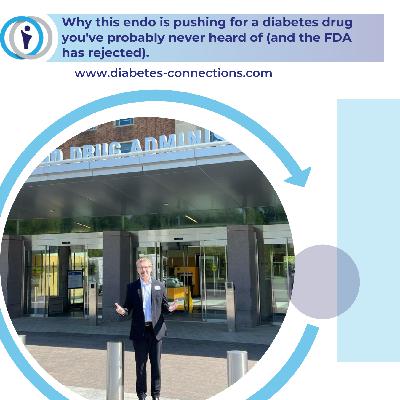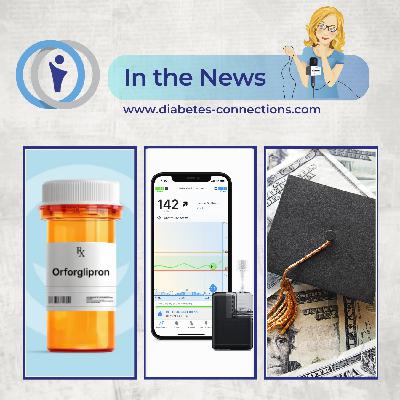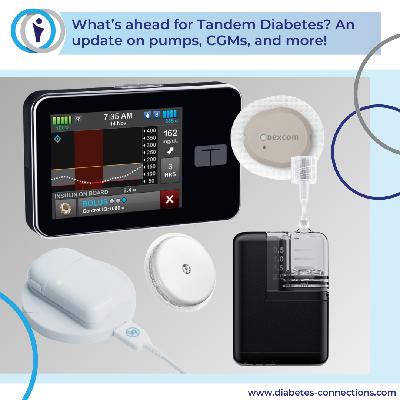In the News.. Insulin pricing, oral pill for T1D prevention studied, false low A1Cs, MedT's new sensor, and more!
Description
It's In the News.. a look at the top headlines and stories in the diabetes community. This week's top stories: Sanofi lowers prices, oral pill for T1D prevention studied, updates from Medtronic, Tandem, and Sequel Med Tech, falsely lower A1Cs (and why that happens), Biolinq gets FDA okay for micro-needle CGM and more!
Find out more about Moms' Night Out
Please visit our Sponsors & Partners - they help make the show possible!
Learn more about Gvoke Glucagon Gvoke HypoPen® (glucagon injection): Glucagon Injection For Very Low Blood Sugar (gvokeglucagon.com)
Check out VIVI Cap to protect your insulin from extreme temperatures
The best way to keep up with Stacey and the show is by signing up for our weekly newsletter:
Sign up for our newsletter here
Here's where to find us:
Learn more about everything at our home page www.diabetes-connections.com
Reach out with questions or comments: info@diabetes-connections.com
Episode transcription with links:
Hello and welcome to Diabetes Connections In the News! I’m Stacey Simms and every other Friday I bring you a short episode with the top diabetes stories and headlines happening now.
XX
French drugmaker Sanofi says it would offer a month's supply of any of its insulin products for $35 to all patients in the U.S. with a valid prescription, regardless of insurance status.
The program, originally meant for uninsured diabetes patients, would now include those with commercial insurance or Medicare, the drugmaker said.
Patients will be able to purchase any combination, type, and quantity of Sanofi insulins with a valid prescription for the fixed monthly price of $35, starting January 1.
Lilly and Novo also have similar programs through which they offer insulin products for $35 a month for U.S. patients regardless of whether the patients have insurance.
There is no law at work here – the only legislation that has changed the price of insulin came with the Inflation Reduction Act in 2022 with the Medicare cap. Helping lower the cost here, biosimilars hitting the market and the huge profitability for GLP-1 drugs for Novo and Lilly
https://www.reuters.com/business/healthcare-pharmaceuticals/sanofi-offer-all-insulin-products-35-per-month-us-2025-09-26/
XX
A pill typically prescribed for rheumatoid arthritis and alopecia might help slow the progression of type 1 diabetes, a new study says. Baricitinib (bare-uh-SIT-nib) safely preserved the body’s own insulin production in people newly diagnosed with type 1 diabetes.. and their diabetes started progressing once they stopped taking baricitinib, results show. They produced less insulin and had less stable blood sugar levels.
Baricitinib works by quelling signals in the body that spur on the immune system, and is already approved for treating autoimmune conditions such as rheumatoid arthritis, ulcerative colitis and alopecia, researchers said.
“Among the promising agents shown to preserve beta cell function in type 1 diabetes, baricitinib stands out because it can be taken orally, is well tolerated, including by young children, and is clearly efficacious,” Waibel said.
“We are hopeful that larger phase III trials with baricitinib are going to commence soon, in people with recently diagnosed type 1 diabetes as well as in earlier stages to delay insulin dependence,” she added. “If these trials are successful, the drug could be approved for type 1 diabetes treatment within five years.”
Findings presented at medical meetings should be considered preliminary until published in a peer-reviewed journal.
XX
An existing transplant drug has shown promise in slowing the progression of type 1 diabetes in newly diagnosed young people, potentially paving the way for the first therapy that modifies the disease after diagnosis.
The Drug, called ATG, is currently used together with other medicines to prevent and treat the body from rejecting a kidney transplant. It can also be used to treat rejection following transplantation of other organs, such as hearts, gastrointestinal organs, or lungs.
The researchers studied 117 people aged five to 25, who’d been diagnosed with type 1 diabetes within the past three to nine weeks. The participants were from 14 centers across eight European countries and were randomized to be given different doses of ATG (0.1, 0.5, 1.5, or 2.5 mg/kg) or a placebo. ATG was given as a two-day intravenous (IV) infusion. The main goal was to see how well the pancreas could still make insulin after 12 months, measured by C-peptide levels during a special meal test. C-peptide is released into the blood along with insulin by the pancreas.
The findings are promising, showing that ATG, even at a relatively low dose, can slow the loss of insulin-producing cells in young people newly diagnosed with type 1 diabetes. The lower dose also caused fewer side effects, making it a more practical option.
https://newatlas.com/disease/antithymocyte-globulin-newly-diagnosed-type-1-diabetes/
XX
The FDA has delayed its feedback on Lexicon Pharmaceuticals’ application to bring Zynquista (sotagliflozin) to people with type 1 diabetes. The agency had planned to respond this month but will now wait until the fourth quarter after reviewing new data from ongoing studies.
Zynquista, an oral drug meant to be used with insulin, has already been approved for heart failure (marketed as Inpefa). But in type 1 diabetes, it faces safety concerns: last year an FDA advisory committee voted 11–3 that its benefits don’t outweigh the increased risk of diabetic ketoacidosis (DKA). The FDA later issued a complete response letter rejecting the drug.
<span style="font-size: 14.0pt; line-height: 107
























